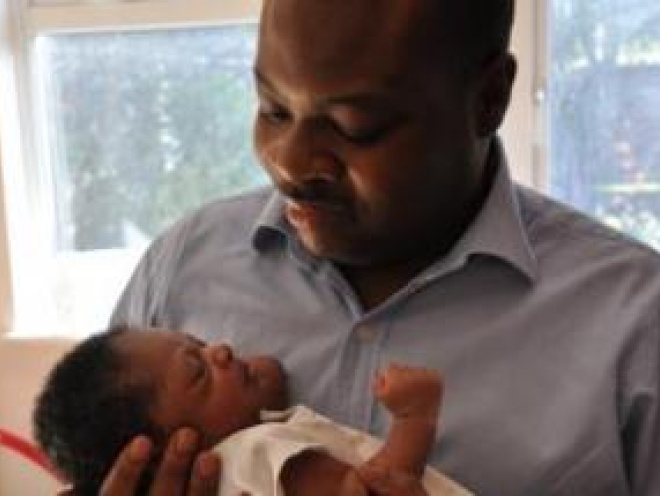After birth, your baby will have health checks to detect conditions and abnormalities. Here we look at the different checks and tests they'll have...
Your baby’s very first postnatal check will be the Apgar score, which your midwife will complete at one minute and then five minutes after he is born. The test is so quick you may not even notice it being done – having just given birth. Your midwife will check your baby for a number of factors including:
- skin colour
- heart rate
- reflex response
- muscle tone
- breathing.
Most babies will show no signs of concern , however, if the midwife notices any issues she can call for immediate treatment. As such these checks are an important aspect of your postnatal care.
Blood spot screening
Throughout the UK, all newborn babies are screened using something called the blood spot test (it used to be known as the Guthrie test or Heel Prick test).
"It’s offered to all newborn babies between five and ten days old, and it can screen for up to five conditions (depending on your health authority)."
It most commonly tests for the following conditions:
- Phenylketonuria: a condition that interferes with an individual’s ability to regulate amino acid. A build-up of amino acids can lead to severe mental handicap.
- Congenital hypothryroidism: this is characterised by a lack of the growth hormone thyroxine. Without this hormone normal growth cannot occur.
- Cystic fibrosis: this is an inherited condition that affects the lungs and digestive system.
Cystic fibrosis is one of the UK's most common life-threatening inherited diseases. Around 9,300 people in the UK have this condition which is caused by a faulty gene that controls the movement of salt and water in and out of the cells within the body. It affects the internal organs, especially the lungs and digestive system, by clogging them with thick sticky mucus. This makes it hard to breathe and digest food.
Each week, five babies are born with cystic fibrosis and currently there is no cure. If two carriers of the faulty cystic fibrosis gene have a child, the baby has a 1 in 4 chance of having cystic fibrosis. Over two million people in the UK carry the faulty gene that causes it - around 1 in 25 of the population. Currently half of the cystic fibrosis population will live past 41 years of age, and improvements in treatments mean a baby born today is expected to live even longer.
Less commonly tested conditions are:
- Sickle cell disease: an inherited disorder that affects the red blood cells, reducing their ability to carry oxygen around the body.
- MCADD: a rare inherited disorder where the body cannot break down fat effectively.
"Few babies are diagnosed with the above conditions, however for the few that are, the benefits of screening and early detection are significant."
Physical examinations
After the birth of your baby, you should be offered two full physical neonatal examinations of your newborn. The first should take place in the first 72 hours after birth and the second should be carried out around six weeks after birth to eight weeks old, around the same time you have your postnatal check-up (see article).
Your baby will be given an overall top-to-toe physical examination but with a special focus on his eyes, heart, hips and for boys, their testes. This examination will help identify specific health conditions including:
- Eye abnormalities such as congenital cataracts and retinoblastoma (a rare childhood cancer).
- Congenital heart disease.
- Congenital dislocated hip (CHD) and developmental dysplasia of the hip (DDH).
- Delayed descent of boys’ testes.
The examinations will provide you with an opportunity to talk with a healthcare professional about looking after your baby and any concerns you may have about his feeding and health. This will also be a good time to discuss any future immunisations your baby will need (see article 'Baby immunisations').
Hearing screening
This test is usually carried out by trained hearing screeners as part of your maternity care in hospital (ask your midwife and/or GP if you have a home birth). It will usually involve a trained screener placing a small soft-tipped earpiece in the outer part of your baby’s ear, which sends clicking sounds down the ear. This type of test is called an automated otoacustic emission (AOAE) screening test. It only takes a few minutes and the results are immediate.
If the test does not show a clear result from either one or both of your baby’s ears then your baby will need a second test, however, this is fairly common and doesn’t necessarily mean that he has hearing problems.
Further information
Our support line offers practical and emotional support with feeding your baby and general enquiries for parents, members and volunteers: 0300 330 0700.
You might find attending one of our NCT New Baby courses helpful as they give you the opportunity to explore different approaches to important parenting issues with a qualified group leader and other new parents in your area.
Make friends with other parents-to-be and new parents in your local area for support and friendship by seeing what NCT activities are happening nearby.
NHS Choices has further information on newborn screening.
NHS Newborn Hearing Screening Programme offers further information on the programme offered throughout the UK.
The Cystic Fibrosis Trust is the only national charity that supports all aspects of living with cystic fibrosis, from diagnosis, to living with the condition, caring for someone with CF and advice on Standards of Care. The CF Trust provides parents with free impartial advice and free parent packs to help families come to terms with a diagnosis and learn about caring for a child with CF. The CF Trust also funds medical research into the condition to help people with CF to live longer and better lives. Call 0300 373 1000 for more information.





